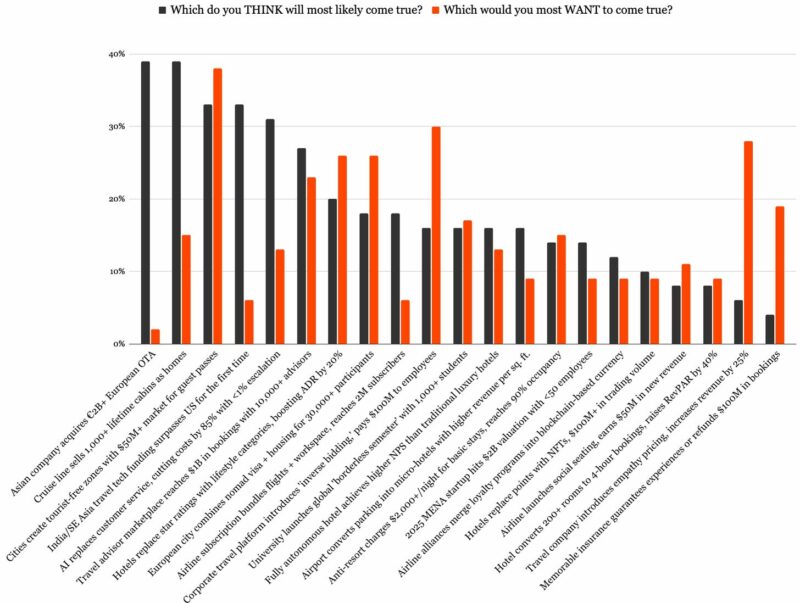
1. Enhanced Guest Experience & Personalization
For a hotel general manager, satisfying every guest isn’t just a goal—it’s everything. It’s the driving force behind every decision, every adjustment, every effort. When a guest leaves unhappy, it feels personal. Any GM who truly cares about their property and guests knows the impact of one bad review or negative word of mouth. In an industry where reputation is crucial, even one unhappy guest can weigh heavily, casting a shadow over the entire team’s hard work.
But here’s the good news: with the help of a Business Intelligence (BI) tool, general managers can prevent this from happening. Data is no longer just numbers—it’s the key to truly understanding and anticipating the needs of every guest, from first-time visitors to loyal repeat customers. Here’s how BI tools can help GMs maximize guest satisfaction at every stage of the guest journey:
Guest Segmentation
Attracting the right guests begins with understanding who they are. With BI tools, general managers can segment guests based on booking history, preferences, demographics, and behavior. A precise segmentation allows you to cater to guests’ unique needs and ensure that your marketing and services speak directly to them. Segmentation ensures that the right guests are walking through your doors—the guests who are a perfect fit for your hotel’s unique offerings. This alignment is critical to preventing mismatched expectations that can lead to dissatisfaction.
Personalized Marketing
Personalized marketing is not just about filling rooms—it’s about setting the right expectations. A BI tool allows you to use data from past stays, spending patterns, and preferences to craft tailored offers and messages that speak directly to each guest. By personalizing your marketing, you can prepare guests for the type of stay they’ll have, whether it’s a peaceful spa retreat or an exciting business trip. The right message before arrival ensures guests know what to expect and primes them for a positive experience.
Service Optimization
Once the guests arrive, the focus shifts to exceeding their expectations. Delivering the experience is where service optimization through BI truly shines. By analyzing guest feedback, spending habits, and service data, you gain a real-time understanding of what guests appreciate most and where improvements are needed. Whether tailoring room preferences, adjusting housekeeping schedules or enhancing dining options, a BI tool helps ensure every guest feels their needs are understood and met. It allows you to deliver those personal touches that make all the difference in the guest experience.
Example Use Case
Imagine a general manager who uses their BI tool to identify a segment of high-value repeat guests who consistently book spa services during their stays. With this insight, the GM can develop exclusive spa packages tailored to them, complete with personalized offers before their stay. When those guests arrive, they feel like the hotel knows what they want, and their satisfaction soars. The feeling of being seen not only boosts ancillary revenue but solidifies guest loyalty, ensuring that they’ll spread the good word and potentially return again and again.
A BI tool goes beyond just monitoring data; it’s about ensuring every guest leaves happy, feeling the hotel team understood and met their needs with attention. As a general manager, the ultimate goal is consistently transforming data into guest satisfaction.
2. Data-Driven Decision Making for Total Revenue Management
As a general manager, it’s not enough to fill rooms—you need to maximize the revenue from every guest who walks through your doors. That’s the ultimate balancing act: delivering exceptional guest experiences while optimizing every opportunity to drive revenue. The more services a guest engages with—whether dining, spa treatments or event bookings—the more satisfied they often are and the more value they bring to the hotel. It’s a win-win. But to achieve this, you need a complete picture of your hotel’s revenue streams, and that’s where a Business Intelligence (BI) tool becomes essential.
A BI tool allows you to take a genuinely holistic approach to revenue management. It goes beyond room bookings and enables you to track and optimize every possible revenue stream—from food and beverage to spa services to events. With the correct data, you can dynamically adjust your pricing strategies, forecast demand, and ensure that every decision you make leans toward maximizing revenue per guest while maintaining an outstanding guest experience.
Benefits
- Comprehensive Revenue Insights: A BI tool provides a unified view of all revenue sources. Instead of treating rooms, restaurants, and amenities as separate silos, you can see how each element contributes to your total revenue picture. Detailed information lets you understand how different guest segments spend across departments, enabling you to adjust pricing and packages to align with guest behaviors. Ultimately, this helps you drive higher revenue without compromising guest satisfaction—when you know where guests are spending, you can tailor services they’re willing to pay for.
- Dynamic Pricing Strategies: In the same way you personalize marketing for guests, you should also be dynamically adjusting your pricing strategies. A BI tool analyzes historical data, market trends, and real-time demand, allowing you to implement dynamic pricing models that ensure your rates—whether for rooms, dining, or events—are continuously optimized. By attracting the right guests at the right price, you boost occupancy and drive higher spending per guest across the property.
- Cross-Departmental Forecasting: Effective forecasting maximizes revenue and delivers an exceptional guest experience. With a BI tool, forecasting isn’t just about rooms—it’s about understanding demand across every revenue stream, from restaurant reservations to conference bookings. When you can accurately predict demand, you can ensure that labor scheduling, inventory management, and service delivery are all aligned to meet guest needs seamlessly. Satisfying guest needs drives higher revenue and guarantees that your team delivers the exceptional service your guests expect.
At the heart of it, maximizing revenue per guest is deeply connected to guest satisfaction. When you use data to understand how guests engage with your hotel—whether they’re enjoying a meal, booking a spa appointment, or attending an event—you can fine-tune your offerings to meet their expectations and drive profitability. A BI tool helps you strike that perfect balance, where every decision is grounded in data, and every action leads to happier guests and healthier profits.
3. Operational Efficiency & Cost Control
Running a hotel isn’t just about providing exceptional service and maximizing revenue—it’s also about controlling costs to maintain profitability. Operational efficiency is where a general manager’s strategic insight comes into play. At the same time, guest satisfaction is paramount; achieving it sustainably and profitably requires balancing resources. A BI tool gives general managers the visibility to optimize operations, reduce waste, and manage costs effectively without compromising the guest experience.
For any general manager, the ultimate measure of success is flow-through—how much incremental revenue you generate translates into actual profit. The more efficiently you run your hotel, the higher your profit margins, making operational efficiency and cost control critical factors driving owner satisfaction and long-term success.
Benefits
- Detailed Understanding of Customer Acquisition Cost & NetRevPAR: One of the most critical yet often overlooked components of cost control is understanding your Customer Acquisition Cost (CAC) and aligning it with the right revenue metrics. A BI tool allows you to break down the cost of acquiring each guest, including marketing spend, distribution fees, and sales efforts, so that you can compare that against the total revenue generated by each guest—through a metric like NetRevPAR (Net Revenue Per Available Room). Understanding CAC guarantees that our commercial team prioritizes profit, not just booking rooms. When your revenue strategy is directly tied to profitability, you can make more informed decisions about which channels and segments to target, maximizing your return on investment.
- Labor Optimization: Labor costs are one of the most significant expenses in any hotel and must be carefully managed without affecting service quality. A BI tool helps general managers analyze guest demand in real-time and forecast occupancy trends, enabling you to align staffing levels with actual needs. Balancing labor schedules ensures that your hotel is neither over nor under-staffed during peak and off-peak times. With this data at your fingertips, you can schedule the correct number of staff to maintain exceptional service while avoiding unnecessary labor costs, ensuring each dollar spent on staffing is fully justified.
- Cost Monitoring: Effective cost control isn’t just about cutting expenses—it’s about identifying inefficiencies and reallocating resources to where they are most needed. A BI tool tracks critical operational costs, such as utilities, food and beverage supplies, and housekeeping materials. With these insights, you can spot inefficiencies or rising costs before they become significant issues, allowing you to implement targeted cost-saving measures. By continuously monitoring operational costs, you can run a leaner, more efficient operation that contributes directly to your bottom line without sacrificing quality.
Example Use Case
A general manager notices through their BI tool that the housekeeping department is consistently overstaffed during low-occupancy periods. Armed with this data, the GM adjusts staffing schedules to better align with occupancy forecasts, resulting in a 10% reduction in labor costs without compromising service quality. In another instance, the tool reveals that the cost of acquiring guests from a specific online travel agency (OTA) is disproportionately high compared to direct bookings. The GM shifts marketing spend toward direct channels, lowering acquisition costs and improving overall profitability.
Ultimately, operational efficiency maximizes your hotel’s profitability while ensuring guests receive the best possible experience. By leveraging a BI tool, general managers can control costs intelligently, align resources with demand, and prevent unnecessary expenses. With a deep understanding of flow-through—how efficiently your hotel turns revenue into profit—you can confidently steer your hotel toward long-term financial health, ensuring a satisfied team, guests, and owners.
Conclusion and Takeaways
To stay ahead in the competitive hospitality industry, general managers must leverage every possible advantage to ensure their hotels are successful and profitable. A BI tool delivers that advantage by transforming how managers approach three critical areas:
- Enhancing the Guest Experience: With more profound insights into guest preferences and behavior, GMs can personalize marketing, optimize services, and ensure every guest feels valued and satisfied, leading to repeat business and positive reviews.
- Data-Driven Decisions for Total Revenue Management: By analyzing all revenue streams—not just rooms—BI tools help managers implement dynamic pricing strategies and cross-departmental forecasting to maximize revenue per guest while maintaining guest satisfaction.
- Driving Operational Efficiency & Cost Control: From optimizing labor costs to monitoring operational expenses and aligning CAC with revenue goals, BI tools enable GMs to maintain profitability without compromising service quality. Understanding flow-through is critical to maximizing profit and delivering exceptional financial results for owners.
A BI tool empowers general managers to make smarter, faster decisions directly impacting the bottom line by providing a complete, real-time view of their hotel’s performance. It’s not just about reacting to what’s happening at the moment—it’s about anticipating trends, forecasting accurately, and setting your team up for success.
If you’re a general manager still relying on Excel sheets for weekly reports, it’s time to step up. A cloud-based Business Intelligence tool developed explicitly for hotels will give you the control, insights, and agility you need to thrive in today’s fast-paced market. Don’t let outdated tools hold you back from delivering the profitability, guest satisfaction, and operational efficiency your hotel—and its owners—deserve.







